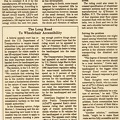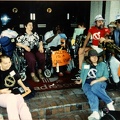Gazette Telegraph 2-14-89
NATION
[Headline] Ruling requires new buses to be wheelchair accessible
Associated Press
PHILADELPHIA - A federal appeals court Monday ordered the U.S. Department of Transportion to require transit authorities across the country to equip new buses with wheelchair lifts.
Attorneys who brought the lawsuit that led to the ruling called it the most important decision ever handed down for handicapped people needing public transportation.
The 3rd U.S. Circuit Court of Appeals said a Transportation Department regulation requiring all new buses to accommodate wheelchairs conflicts with another allowing communities to offer only an alternative service, such as special vans, to the handicapped.
The court said a rule requiring reservations 24 hours in advance for use of the alternative transporation hinders the spontaneous use of mass transit by the handicapped. As a result, the court ordered transit authorities to make “reasonable accommodations to their programs, i.e. purchase wheelchair-accessible buses.
The court also upheld a controversial decision requiring the Transportation Department to eliminate a cap on the amount of money transit authorities need to spend on making transportation accessible.
A coalition of disabled people and 12 organizations called Americans Disabled for Accessible Public Transportation filed the lawsuit last year.
ADAPT contended that a provision of the federal regulations allowed authorities receiving federal transportation funds to exclude the handicapped from “effective and meaningful" access.
The provision allows transit authorities to decide among three types of handicapped-accessible transportation: accessible buses, special vans for the handicapped or a combination of the two.
Timothy Gold [Cook], who argued the case before the court, said the ruling was "a major, major victory for the handicapped community."
- Created on
- Friday 12 July 2013
- Posted on
- Friday 11 September 2015
- Tags
- 24 hour advanced reservation, 3% cap, 3rd US Circuit Court of Appeals, ADAPT, disabled people, DOT, Tim Cook, wheelchair lifts
- Visits
- 2371
- Rating score
- no rate
- Rate this photo


0 comments